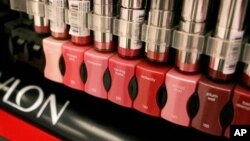Revlon Inc. said it would exit China, where sales of its cosmetics have been falling, and cut more than 1,000 jobs as part of a restructuring designed to save about $11 million a year.
Revlon, owner of the Almay cosmetics brand and Sinful Colors nail polish, said in a filing that its Chinese operations accounted for about 2 percent of total net sales. The company posted net sales of $1.43 billion in 2012.
Revlon said it would cut 1,100 positions, primarily in China, including 940 beauty advisers retained through a third-party agency. Revlon had 5,100 employees as of Dec. 31, 2012.
The company's shares, which have risen nearly 70 percent this year, fell marginally on the New York Stock Exchange.
The Chinese market is full of potential for Western brands. The Chinese cosmetics market more than doubled in size between 2008 and 2012 to $22.8 billion, according to a report in March by Fung Group that cited the National Bureau of Statistics in China.
That has been a boon for companies such as high-end beauty products maker Estee Lauder Companies Inc., whose sales in Asia last quarter rose 7 percent, helped mostly by China, where Estee Lauder has expanded to second-tier cities more quickly than many other Western beauty brands.
Other, non-beauty, U.S. companies to see fast growth in China include handbag maker Coach Inc. and Tiffany & Co.
Falling China sales
But China is also a complex market that can bedevil foreign companies.
Avon Products Inc., a direct seller of cosmetics, saw sales fall 24 percent in 2012 in China, where its reputation has been hit by a bribery probe, and where it has struggled to adapt to selling through retail stores.
Revlon's sales in China declined in 2012, a trend that continued into the first half of this year. The company, which entered the market in 1996, has attributed the fall to declining consumption linked to a slowdown in Chinese economic growth.
“We made a holistic assessment of the opportunity in China versus the cost of doing business there, and we concluded that it made the most sense to exit the market,” Revlon spokeswoman Elise Garofalo said.
According to the National Bureau of Statistics of China, total retail sales of cosmetics grew 13.2 percent in the January-November period, compared with growth of 17 percent in the whole of 2012.
Some cosmetics companies operating in China have also faced pressure from animal rights groups, as the country requires companies to test beauty products on animals.
The China Food and Drug Administration said in November it was considering a rule change that would allow the sale of some cosmetics without requiring them to be tested on animals.
Revlon, owned by buyout titan Ronald Perelman, expects to incur about $22 million of pre-tax restructuring and related charges.
About $10 million of the charges will be employee-related costs, with the rest from sales markdowns and inventory write-offs, the company said on Tuesday.
Revlon said it recorded $20.9 million of the charges in December 2013, with the rest expected during 2014.
The company said about $8 million of the annual savings are expected to benefit 2014 results.
The company's shares were down 0.2 percent at $24.50 in afternoon trading.











